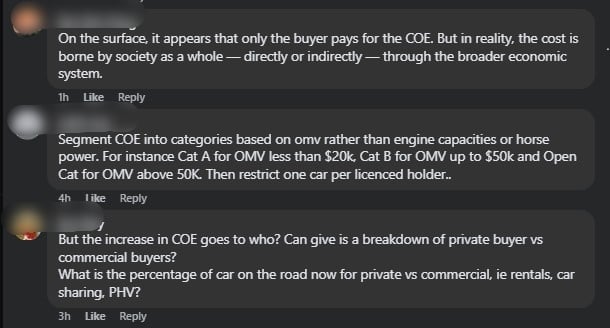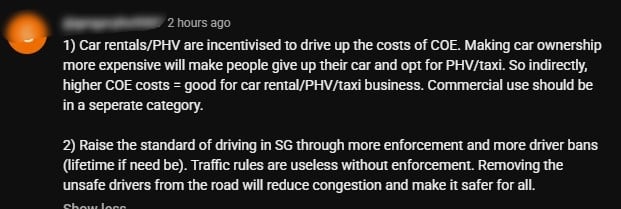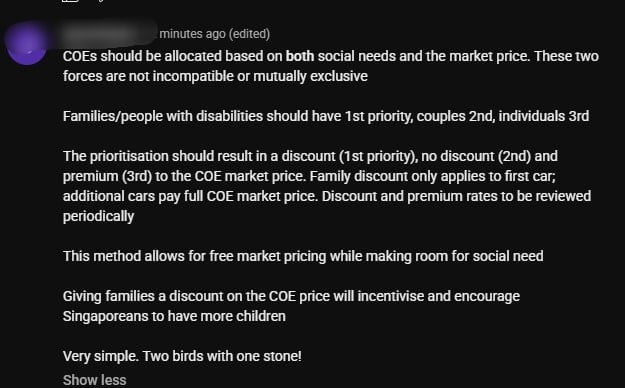- Joined
- Dec 6, 2018
- Messages
- 19,232
- Points
- 113
SM Lee defends market approach for COE while Jamus Lim urges more empathy and social fairness - The Online Citizen https://share.google/Z6ewL4W5RcaPPRZZD
It is not the duty of the govt to ensure that more S'poreans are able to afford a car. As such, it boils down to affordability; if one is able to pay for a car, he may own as many as he is able to pay for. What is next? Will more S'poreans demand that prices of houses and condos be lowered so more than the current 15% of residents can afford private residences?Actually its true....cannot afford don't buy car....COE is one issue....what about running costs etc? Better to just depend on pubic tpt
Not everyone can afford a GCB in SG. Is the govt expected to make such houses affordable to the masses?High SES defending High SES, low SES suck thumb take bus, mrt, and bmw
The current pricing mechanism has caused a contraction with a multitude of marginal car owners giving up their wheels after the expiry of their COE. While it makes sense for the majority of the population in an urban metropolis to rely on public transportation, existing car owners are reluctant to give up something which has become an extension of themselves, and not merely a tool to get from point A to B.got many millionaires ready buyers on these ATAS COE mah… fittest survived
Conspicuous consumption boosts our sense of identity and also conveys status and importance. In land-scarce S'pore, the less affluent have to make way for the wealthy; nowhere is this more clearly apparent than in car ownership. Unlike one’s private home, a set of 4-wheels is a possession that can be literally displayed at different places to a wider audience throughout the day. Car owners are perceived as wealthier and having membership to a higher social status group - not just to others, but also to themselves.got many millionaires ready buyers on these ATAS COE mah… fittest survived
We have reached the day when only top earners are able to possess cars. This will, in fact, make car ownership even more attractive to those who can afford it.Actually its true....cannot afford don't buy car....COE is one issue....what about running costs etc? Better to just depend on pubic tpt
65% sheep’s agreed de wohSM Lee defends market approach for COE while Jamus Lim urges more empathy and social fairness - The Online Citizen https://share.google/Z6ewL4W5RcaPPRZZD
A mere 8% of S'poreans own cars, so many who voted for this greedy govt are happy with taking public transport.65% sheep’s agreed de woh
The pap have no interest in keeping coe prices down...so to the ppl... if u want to continue with the rat race n get a car etc...its yr free will....but donch comprain bcos 65% supported such policies. For me , I choose pubic tpt so Its easier on my wallet...n my financial future. ...donch forget coe is only 1 component, vehicle licence, road tax, erp, fuel, insurance, maintenance...is not cheap...n all benefit pap hor....so why suffer extra for the establishment?We have reached the day when only top earners are able to possess cars. This will, in fact, make car ownership even more attractive to those who can afford it.
Tat y I donch own car n I live in HDB..bcos I cannot afford anything else n I live within ny means..It is not the duty of the govt to ensure that more S'poreans are able to afford a car. As such, it boils down to affordability; if one is able to pay for a car, he may own as many as he is able to pay for. What is next? Will more S'poreans demand that prices of houses and condos be lowered so more than the current 15% of residents can afford private residences?
Wow…Low SES sinkies who own cars are all fucktards. Buying the car is easy. But they are too retarded to think about the monthly installments, petrol cost, ERP, parking, maintenance..... and then they still have the cheek to complain about high cost of living. What a bunch of pathetic losers.




He doesn't get to call himself LaoLan if his balls were growing the right side upThis guy is a disgrace. Before election every can change, after election you die your own business. Hope he get his due punishment in the next realm.
